News
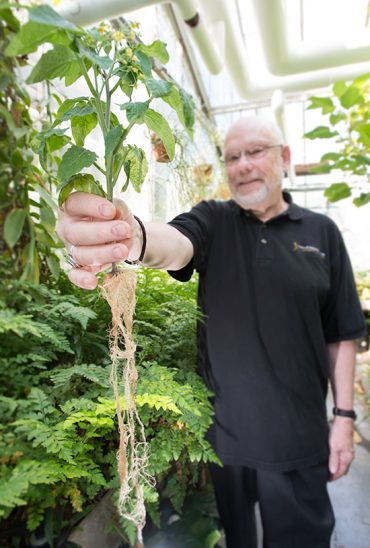
Nov. 22, 2013
The sweet path: how scientists try to understand sugar movement in plants
Roots play a key role in regulating where sugar ends up in plants like tomato. Plant scientists are borrowing a tool from medicine to unravel how plants fight off an attack. The Schultz-Appel Chemical Ecology lab used PET scans to decipher how and when a plant uses resources to fight off a disease or insect. Positron emission tomography (PET) scans detect radioactive tracers and how they travel over time. In humans the scan tracks blood flow to find cancers, understand brain activity and show uptake…
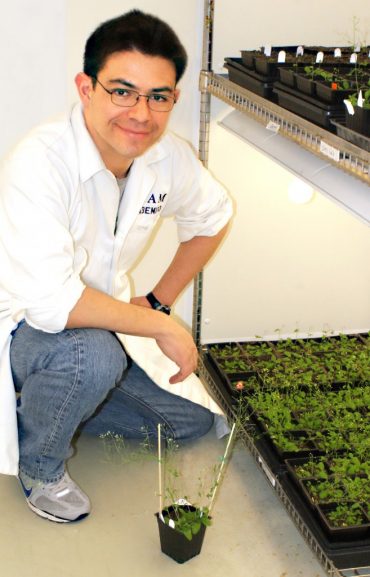
Nov. 8, 2013
Searching for the gene: MU scientist works to find link to nutrient content of seeds
David Mendoza-Cozatl uses Arabidopsis plants like these as a model to understand how plants transport nutrients from soil to seeds and leaves.Courtesy Randy Mertens/CAFNR Forget fruits and vegetables, seeds provide a critical part of the average person’s diet. From beans to cereal grains, understanding how genes and soil types impact nutrition could one day help produce more nutritious food. One University of Missouri researcher wants to know which genes control the elements in these nutrient-rich packages. “Iron and zinc deficiencies are considered two major nutritional disorders in the world,…
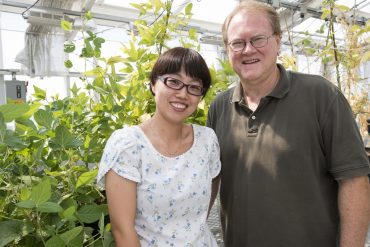
Sep. 9, 2013
The secret of the legume: Bond Life Sciences Center researchers pinpoint how some plants fix nitrogen while others do not
Yan Liang and Gary Stacey research the symbiosis between legumes, like these soybeans, and nitrogen-fixing bacteria at the Bond Life Sciences Center. A silent partnership exists deep in the roots of legumes. In small, bump-like nodules on roots in crops like soybeans and alfalfa, rhizobia bacteria thrive, receiving food from these plants and, in turn, producing the nitrogen that most plants need to grow green and healthy. Scientists have wondered for years exactly how this mutually beneficial relationship works. Understanding it could be the first step toward engineering other crops to use less nitrogen, benefitting both…

Aug. 16, 2013
MU researchers tackle tough grapevine pest
Division of Plant Sciences and Bond LSC investigators Jack Schultz and Heidi Appel have been awarded a grant by the National Science Foundation to unravel the mystery of how an insect pest gets the better of the world’s – and Missouri’s – most valuable fruit crop. Grape phylloxera is an insect that infests grapevine leaves and roots, reducing the plant’s production and cutting off its water supply. The insect somehow convinces the plant to construct a complex home and feeding site around itself, called a gall. Many kinds of insects can cause plants to create galls, but no one knows…
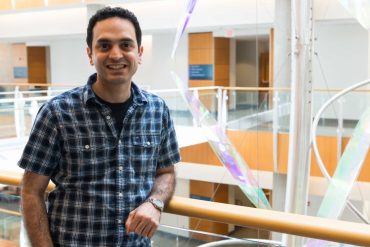
July 24, 2013
Bond LSC post doc recognized for his research on novel HIV drug
Lefteris Michailidis received the 2013 Distinguished Dissertation Award for his work to understand EFdA, a new drug that shows promise to treat resistant HIV viruses with fewer side effects. A four-letter drug could be the next generation of AIDS treatment. EFdA, a new anti-viral drug in development, promises HIV treatment that is more effective with fewer side effects and less resistance. Lefteris Michailidis received the 2013 Distinguished Dissertation Award earlier this year from the MU’s Graduate Faculty Senate for his work to understand how EFdA works on a molecular level. Michailidis currently works as a post-doc…
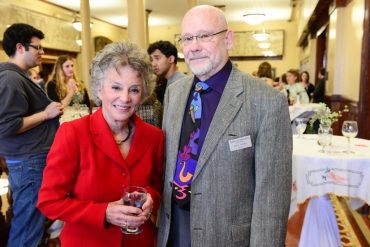
March 15, 2013
Claiming Kin, MU’s 9th annual Life Sciences and Society Symposium kicks off today
Stephanie Coontz, award-winning writer on the history of marriage, chatted with Jack Schultz, director of the Bond Life Sciences Center. Coontz presented the keynote address Friday night at Claiming Kin, MU’s 9th annual Life Sciences and Society Symposium. Check out Saturday and Sunday’s speakers on the subject of kinship athttp://lssp.missouri.edu/claimingkin/schedule. Article originally published on Decoding Science.
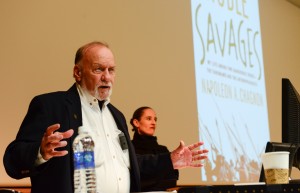
March 13, 2013
Renowned anthropologist speaks about Noble Savages
Napolean Chagnon spoke to a full house Tuesday in Monsanto Auditorium about his new book, Noble Savages. Chagnon joined MU’s Department of Anthropology as Distinguished Research Professor and Chancellor’s Chair of Excellence in 2013. He was elected to the National Academy of Sciences in 2012, but is most known for contributions to his genealogical research, his contributions to evolutionary theory in cultural anthropology and his work in the study of warfare. His new book is a retrospective look at his work as an anthropologist, where he most famously document the Amazonian Yanomamö tribe of Venezuela in the…
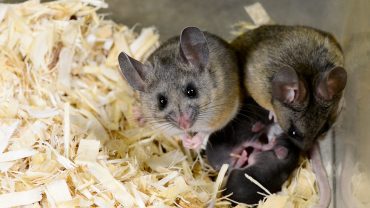
Feb. 12, 2013
It’s a matter of territory
Territory matters to California mice when it comes to mating. Males in this monogamous mouse species use their scent glands to mark the boundaries of their home range, making their dominance known one scent at a time to other males. Too much bisphenol A (BPA) in their environment can change that, short-circuiting their ability to complete this crucial task. Male mice fed BPA couldn’t mark territory when a normal male entered their environment, putting them at a disadvantage. That means the chemical could seriously impact whether these mice pass their genes on to the next generation. Cheryl Rosenfeld, a researcher…

Jan. 29, 2013
Welcome
Jack Schultz, Professor of Plant Sciences and Director of the Bond Life Sciences Center Welcome to Decoding Science, a new science blog from the Christopher S. Bond Life Sciences Center at the University of Missouri! The Bond Center is a highly interdisciplinary research organization that promotes collaboration to address questions where different disciplines and study systems meet. Our approaches range far and wide through the life sciences and beyond. So we have lots of stories of our own and we follow interesting science tales everywhere we find them. So, why “Decoding Science”? Well, we realize that…
- « Previous
- 1
- …
- 43
- 44
- 45
- 46